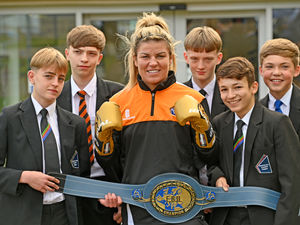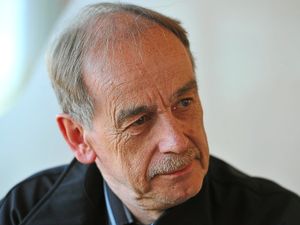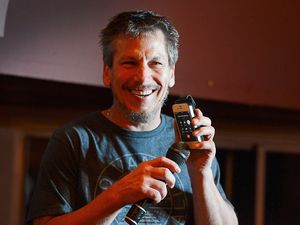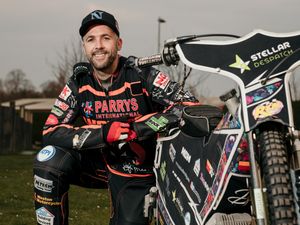Last ride of the Cradley Heathens
There can be few other stories to have evoked so much frustration over the past 10 years as that of Cradley Heathens Speedway.
For a time at the beginning of the decade, the club looked set to become a remarkable tale of sporting resurrection.
Kept alive by the will of supporters since being evicted from their Dudley Wood home in 1995, the Heathens now had a team back racing on the track and winning titles.
Granted, it was being done in exile at the Monmore Green home of their Wolverhampton rivals. But the Heathens had a management team with the experience and the will required to push the club forward and, with momentum seemingly firmly behind them, it seemed a question of when and not if they would find a new, permanent home of their own back in Dudley borough.
It never happened. Last week’s announcement the club would not be fielding a team in league racing next season, while sad, was not surprising.
Though some supporters might hold out hope for a change of heart and while it is true the Heathens have defied the odds to race on for at least the past two seasons, the message delivered privately from the management committee is that, at least for them and this iteration of the club, this really is the end of the road.
The question then is why, despite their efforts, the encouraging noises made by numerous Dudley councillors and the desire of supporters, did the club fail to find a new home?
The truth is there is no single answer. When all the strands are pieced together, it becomes clear that for the Heathens to find a new home in either Dudley or Sandwell borough it required several ingredients to come together and at no stage were those ingredients ever present at the same time.
If it was going to happen for the Heathens, it would have happened at the height of their resurgence around 2012 or 2013.
Having been restored to league racing in 2010, first under the Dudley Heathens banner, the club was enjoying success on the track and drawing four-figure crowds despite competing in the third-tier National League.
At the same time, the management trio of Nigel Pearson, Chris Van Straaten and Gary Patchett were in regular dialogue with Dudley Council as they searched for a suitable site to place a new track.
On several occasions, solid plans were drawn up. The first proposal, for a multi-use stadium situated on Castle Hill which would have been shared with non-league football club Gornal Athletic, were hampered by concerns over the impact of noise on the animals at nearby Dudley Zoo.
It is understood the club were also involved in advanced talks to build a track on disused land on Canal Street in Brierley Hill, only for the project to be scuppered by plans to extend the Midland Metro tram route through the same site.
A familiar pattern became apparent. As soon as a potential site was located, problems would emerge. In 2014, the club found itself having to switch race nights to Birmingham’s Perry Barr track and attendances immediately began to fall. In hindsight, the window of opportunity to find a new home had by then already disappeared.
The temptation is to blame Dudley Council for what many perceive as a lack of assistance. There is certainly no hiding the fact their record on sport and leisure is lamentable. The ongoing plight of Dudley Town Football Club, homeless since 1985, is evidence of that.
Yet there are others who would claim the council did what they could to help the Heathens.
Les Jones, a long-serving councillor who was cabinet member for regeneration and later council leader until 2012, believes environmental issues – chiefly the noise made by bikes – were always going to be difficult to overcome.
“Since the Heathens left Dudley Wood, there have been huge changes in regulation with the priority on protecting people’s right to peace and quiet,” he explains.
“It is the same legislation which sees pubs and factories get shut down when houses get built next to them.
“Dudley borough has a lot of green space, but almost all of it has housing nearby. Certainly during my time in the cabinet I was keen to do all I could to help the Heathens, but it was always going to be a big ask.
“Wherever you chose as a site, the public objection was always going to be massive.”
That was certainly the case in 2007, three years before the club returned to the track, when campaigners submitted plans for a track on greenland between Cradley and Lye.
That project never survived the initial backlash from residents and though supporters might point out modern bikes are now far quieter, the question will always be whether they are quiet enough to sway public opinion.
Critics of Dudley Council might point to the investment made by their Manchester counterparts in the National Speedway Stadium, the home of Belle Vue Aces.
But that project has come at a considerable £7million cost and is expected to run at a loss until the end of next year.
Neither were Dudley the only council unable to find the Heathens a home. Neither could Sandwell, despite several of its councillors making encouraging statements in the early part of the decade.
Manchester is also something of an exception to the rule in a sport which is shrinking rather than growing. The Heathens are not the only famous club to have found the going tough. Workington are no longer running, Coventry’s Brandon Road home has been closed since 2016, while Stoke are set to fold with their Loomer Road Stadium – briefly shared with the Heathens following the closure of Dudley Wood – the latest set to be sold for housing.
Had the Heathens been able to find a new home in the past decade, they would have been bucking the trend. Ultimately, the obstacles proved too much. Last month it reached the point where, despite expending countless time, effort and cash, the management team finally ran out of hope.
The latter still lives on in the hearts of supporters, just as it has since 1995. It is difficult, however, to remember a time since the club’s departure from Dudley Wood when a return to borough has felt quite so far away.
The past decade saw them get close yet, ultimately, never close enough.





